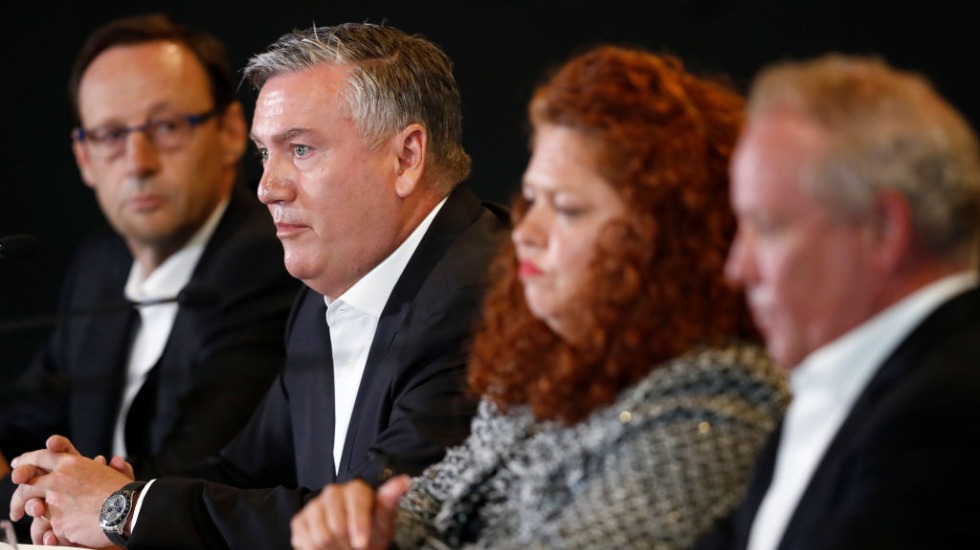Collingwood president Eddie McGuire, with Mark Anderson, directors Jodie Sizer and Peter Murphy. Photo: GETTY IMAGES
If Collingwood’s response to Monday’s leaking of the independent report into alleged systemic racism within its ranks was to prove a watershed moment in the club’s history, it needed, before anything else, to present as both apologetic for its past and humbled by the report’s damning findings.
Not for the first time in Eddie McGuire’s 22-year presidency, when it came to thorny subject matter, it did neither. Quite the reverse, in fact.
Indeed, that was established with the very first words McGuire uttered before a sceptical media throng. They were, believe it or not: “This is a historic and proud day for the Collingwood Football Club”. Really, Ed? Really?
There’s spin and then there’s spin. But frankly, that was just bullshit.
Damningly in this case, it was also a perfect example of exactly what the 35-page independent review conducted by academics Larissa Behrendt and Professor Lindon Coombes, the “CFC Do Better Report”, had concluded was a major part of the club’s problem.
“Collingwood’s response has often been perceived as one where claims of racism are dealt with in terms of damage control and protecting the brand, rather than seeking to address issues and make change,” the report said.
That disingenuous and some would say tone-deaf introduction from McGuire, seated alongside Collingwood chief executive Mark Anderson, board members Peter Murphy and Jodi Sizer, the latter an Indigenous woman who opened proceedings by conducting a “Welcome to Country”, was the worst possible start.
And things didn’t necessarily improve much from there. McGuire’s passion for his club is undisputed. But it also leads him time and again into a knee-jerk defensive posture. And this was certainly one occasion on which that couldn’t be afforded.
Yes, Collingwood had at least commissioned a report into the allegations of systemic racism from former premiership player Heritier Lumumba. Yes, the report offers a series of recommendations – 18 of them – to improve the response of the club to cultural and racial issues.
But it was telling indeed that even while the Magpie president banged on about wanting to move forward without recriminations, he never actually got around to citing in detail the substance of those recommendations.
More significantly, wouldn’t even he agree that a key tenet of moving forward is to accept and understand the damage done in the past? Yet this whole media performance smacked of wanting to gloss over the past and smack down any perceived negativity.
“This isn’t criticism. This is a review,” McGuire told the assembled media. “It’s very strong because we asked them to go as hard as they could, so we could have a base to build our club on. We wanted to seize the moment.”
Hang on a moment. Did he really say: “This isn’t criticism”? Here’s just a small sample of quotes from the report.
* “Systemic racism within the Collingwood Football Club that must be addressed if things are to change”.
* “There is a gap between what Collingwood Football Club says it stands for and what it does.”
* “While claims of racism have been made across the AFL, there is something distinct and egregious about Collingwood’s history.”
If those are not criticisms, that is McGuire’s club being damned with pretty damn faint praise. Either that, or I am the Pope.
Perhaps sensing that not nearly enough contrition was on display, Magpie board member Murphy conceded that the report had been “confronting to read”.
PLEASE HELP US CONTINUE TO THRIVE BY BECOMING AN OFFICIAL FOOTYOLOGY PATRON. JUST CLICK THIS LINK.
But if the matter is as significant to Collingwood as those representing the club at this news conference wanted us all to believe, why did it not move more quickly to first publish (as it said it would) then respond to its contents?
Collingwood received the report on December 17. That is more than five weeks ago. Which, even allowing the Christmas break and the complications of group meetings under the cloud of Covid, offered plenty of opportunity.
The fact that the response came only after the report was leaked to the media, and the fact that once that happened the club was able to mobilise four key respondents to address the media in a matter of hours does tend to suggest it wasn’t exactly a high priority.
Which is a pity, because the report is comprehensive, and it does, as McGuire insisted, deliver positive solutions to the problems identified.
They are things like a board audit, to make sure members “through their behaviour and beliefs” reflect the club’s diversity goals and embrace anti-racism and inclusion principles. The review suggests the board be held to account through an employment strategy with key performance indicators, significantly “including the player group and the coaching staff.”
It also suggests Collingwood create a “clear pipeline” for the development of talent from diverse communities. It should proactively support recruiting “First Nations and people of colour into post-playing positions”, particularly coaching.
McGuire could have cited any of those points after issuing a quick mea culpa, and this would indeed have been seen as, for all the causes of the report in the first place, a relatively positive outcome.
The problem with inherent racism in a 21st century context, however, whether in a sporting or societal environment, is that it is often more unconscious than overt. Which made this press conference illuminating, just not in the way the Magpie president would have liked.
Towards the end, a reporter asked McGuire whether it might have been helpful to acknowledge some of the “awful” incidents which had taken place under the Collingwood Football Club banner.
After reiterating his opening “day of pride” comment, Eddie responded: “I don’t know what you mean because we’re putting in place all the recommendations. We hear a lot of talk in this space; we’re doing something … yes, in a period there are mishaps along the journey, as there’s been in all walks of life and all organisations.”
Pulled up by the same reporter as to whether the word “mishap” threatened to trivialise what was actually acknowledged as racism, McGuire got a little annoyed.
“I’m sorry I haven’t brought my thesaurus with me. I don’t think anyone’s making light of or trying to diminish the message today,” he said. “There shouldn’t be anyone trying to have a ‘gotcha’ moment here.”
But there wasn’t. What McGuire seemed not to understand, a failure which doesn’t augur well for this report no matter how well-intentioned, was that it is those sort of word choices, plus brazen attempts to spin a silk purse out of the proverbial sow’s ear, which scream “gotcha”, this time when it comes to attitudes to a very important issue.












Eddie could hardly stand there penitent and humble. To do so would require admitting that, essentially, this is his problem. It’s been his club for 22 years. And he’s had his own public ‘mishaps’, too.
I can’t remember an Eddie ‘apology’ that wasn’t wrapped in obfuscation, spin and rationalisations. And there’s been a lot of them.
What can’t be denied is the very pertinent point that whenever the league has a confronting racist moment Collingwood tends to be in some way involved whether it’s their supporters, players or administrators. It’s not a coincidence but rather a measurement of the club’s inability to set the appropriate and minimum standards throughout its organisation and fan base.
Well said Rohan . Eddie is the master of spin and it’s a bit of a coincidence that he pulled the pin about the same time that the report was concluded.
As a Swans supporter I understand exactly the failure. It’s is the same spin that they were reporting. Didn’t even change their usual spin. . No consideration, no comprehension, nothing.
Tragic. But then he’s learning from the current PM on how to spin and then not do anything. The despicable injustice still being promulgated, in large part because Maguire won’t properly ‘fess up’ to Collingwood’s part, is the vilification of Adam Goodes. It’s a blight on the country not just the game. I admire Eddie and Frank Maguire. But I can’t abide Eddie’s misjudgement on the Goodes issue, as well as the Heritier Lumumba harassment. It’s a bad call on Eddie’s behalf to spin it through this Report. But there are other ‘players’ here. Right wing print, radio and television journalists and so called experts on the game who condemned and misrepresented Goodes. Disgraceful. And this is not going away. A bit like Jan 26th. The truth is the truth. Eddie could’ve got the ball rolling in the correcting this miscarriage. He went for gloss instead. Sad.